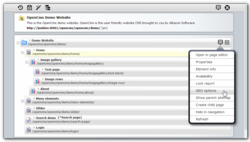OpenCms
 The sitemap editor of OpenCms | |
| Developer(s) | Alkacon Software and the OpenCms community |
|---|---|
| Stable release | 9.5.2
/ June 24, 2015 |
| Repository | |
| Operating system | Cross-platform |
| Platform | Java, XML |
| Type | Content management system |
| License | GNU Lesser General Public License |
| Website | www.opencms.org |
OpenCms is an open source content management system[1] written in Java.[2][3] It is distributed by Alkacon Software under the LGPL license.[4] OpenCms requires a JSP Servlet container such as Apache Tomcat.[4]
It is a CMS application with a browser-based work environment, asset management, user management, workflow management, a WYSIWYG editor, internationalization support, content versioning, and many more features including proxying of requests to another endpoint.[2]
OpenCms was launched in 1999,[4] based on its closed-source predecessor MhtCms. The first open source version was released in 2000.
OpenCms has been used by large organizations such as the Chicago Mercantile Exchange, the LGT Bank of Lichtenstein, BP South Africa, and UNICEF Netherlands.[4]
User interface
The OpenCms user interface runs in a web browser, placing control elements directly on the web page that is edited. Content on a page can be modified by drag and drop.[5] Text can be edited “inline” directly on the web page, or in an alternative form based editor.
Web pages and their navigation structure are managed in a dedicated sitemap editor. Content elements are stored in galleries and can be reused between different web pages or web sites. An additional “power user” interface for Administrators provides role and permission management. Since version 9.5 OpenCms offers layout and template creation without coding.[6]

Technology
OpenCms runs on the Java platform as a servlet. It uses several libraries provided by the Apache foundation. The user interface has mostly been developed using the Google Web Toolkit.
The OpenCms content repository is stored in a database, with MySQL, PostgreSQL, HSQLDB, Oracle, MSSQL and DB2 being natively supported. It can be accessed with CMIS, WebDAV as an SMB network share or through the native web interface.
Text content in OpenCms is defined using an XML schema. The user interface for the content managers creates XML files based on these schemas, which are stored in the database repository. A template system based on JavaServer Pages then creates web pages from the XML.
Versions
OpenCms has been under continuous development as an open source project since the year 2000. A major version is released every 18 to 24 months, and bugfix releases are usually available every 3 to 4 months. The revision control of the OpenCms source code is done using Git on GitHub.[7] The following table provides an overview of all major OpenCms releases.[8]
| Version | Release date | Important new features |
|---|---|---|
| 4.0 | 2 Feb 2000 | Online / offline workflow, WYSIWYG editor for web pages, explorer, user management |
| 5.0 | 5 May 2002 | Page templates in JSP with own <cms:> tag library, extended caching and static export of pages |
| 5.3 | 11 Dec 2003 | Full text search using Lucene, direct edit of web pages |
| 6.0 | 30 Jun 2005 | Updated user interface, storage of content in XML files based on XSD, management of multiple sites |
| 6.2 | 31 Mar 2006 | Integrated image scaling, visual comparison of document versions |
| 7.0 | 04 Jul 2007 | Support for WebDAV, automatic link management, category tags for all content files |
| 7.5 | 15 Jun 2009 | Content galleries, extended support for creating JSP using expression language |
| 8.0 | 8 May 2011 | Enhanced user interface allowing drag and drop of elements in the page and sitemap editor, support for mobile devices |
| 8.5 | 24 Sep 2012 | "Inline" editing of web pages, integration of Apache Solr, CMIS support, SEO features |
| 9.0 | 08 Nov 2013 | Preview for mobile devices, accessing the content repository using a network share, visual site management interface, demo template based on Bootstrap |
| 9.5 | 03 Nov 2014 | Nested containers allow template and layout creation with drag and drop, user generated content, PDF creation, extended editor roles, spell checking in the WYSIWYG editor, visual management of galleries, categories and templates |
Legend: Old version, not maintained Old version, still maintained Latest version Latest preview version Future release | ||
Further reading
- Liliedahl, Dan. Opencms 7 Development. Packt Publishing. ISBN 978-1-84719-105-2.
{{cite book}}: Cite has empty unknown parameter:|coauthors=(help) - Butcher, Matt. Managing and Customizing Opencms 6 Websites: Java/JSP XML Content Management. Packt Publishing. ISBN 978-1-904811-76-3.
{{cite book}}: Cite has empty unknown parameter:|coauthors=(help) - Butcher, Matt. Building Websites with OpenCms. Packt Publishing. ISBN 978-1-904811-04-6.
{{cite book}}: Cite has empty unknown parameter:|coauthors=(help)
References
- ^ Rähm, Jan (2007-06-26). "OpenCMS 7 kurz vor Veröffentlichung" (in German). Retrieved 2009-01-23.
- ^ a b Asipenko, Slava (17 Sep 2006). "OpenCms 6.0: A Review". CMS Watch. Retrieved 2009-01-23.
- ^ "Quelloffenes Content-Management". 2002-04-26. Retrieved 2009-01-23.
- ^ a b c d McGrath, John (28 November 2002). "Open-source CMS: On the rise". ZD Net. Retrieved 2009-01-23.
- ^ OpenCms release notes describing drag and drop editing features
- ^ OpenCms release notes describing template and layout creation without the need to code
- ^ News release about using GitHub for OpenCms
- ^ Overview of all OpenCms releases in the history.txt file on GitHub
